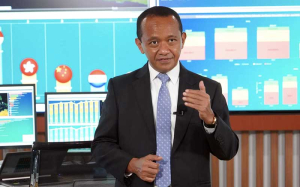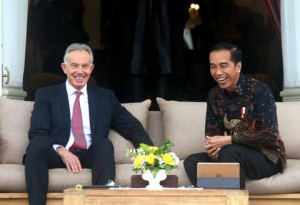Bahlil says Indonesia responds calmly to U.S. tariff policy
Minister of Energy and Mineral Resources (ESDM), Bahlil Lahadalia, has downplayed concerns over U.S. President Donald Trump’s tariff policy, emphasizing that it is merely a matter of trade politics and not something to be overly worried about.
Speaking to reporters, Bahlil said that while the tariff policy affects exports and imports, Indonesia's trade balance remains healthy, with a surplus of US$14.6 billion, according to the Statistics Indonesia (BPS).
“To maintain this balance and avoid a 32 percent export tax, the government is preparing comprehensive measures, including increased purchases of certain commodities from the United States, such as LPG and oil,” he said on Friday, April 11, 2025.
When asked whether Indonesia would retaliate against American companies operating locally, Bahlil said, “No need to exaggerate. This is just trade politics − it’s normal. In HIPMI (Indonesian Young Entrepreneurs Assocition), we deal with things like this all the time.”
He also responded to comparisons with China’s retaliatory actions, noting that each country must act based on its domestic priorities. “Every country will prioritize its own interests depending on its baseline. We respect that, but there's no need to consider this extraordinary. Stay calm,” he said.
Bahlil outlined that Indonesia's economic growth is driven primarily by domestic consumption (53 percent), followed by investment (30 percent), government spending (5–6 percent), and exports-imports (only 3–5 percent). With exports to the U.S. accounting for just 10 percent of total exports, he argued the direct impact of the tariffs on the national economy would be limited. However, he emphasized the importance of responding to the issue carefully and wisely to maintain both domestic and international confidence.
Legitimizing U.S. tariff policy
Syafruddin Karimi of the Department of Economics at Andalas University criticized the lack of firm response to the United States' unilateral tariff policy under President Donald Trump, warning that silence in the face of such actions amounts to legitimizing systemic chaos designed to serve narrow interests.
"Negotiation is important, but when it emerges from pressure and intimidation, it only perpetuates inequality and reinforces the dominant position of major powers like the United States," Karimi said.
He argued that when a nation uses its economic strength to impose unilateral tariffs and force compliance, it goes beyond trade policy and becomes a form of global bullying. “If the world remains silent in the name of ‘peaceful cooperation’, we are essentially allowing international economics to be held hostage by arbitrary political interests,” he said.
He further warned that such practices could be considered a form of economic and social genocide carried out under the banner of geopolitical dominance. According to Karimi, this requires a strong moral and political stance, especially from developing countries.
“In this context, we must not make peace with injustice, bullying, or systemic coercion,” Karimi said. “Global justice demands that nations − especially those in the Global South − dare to speak up and build solidarity to reject unilateral pressure, not to appease it with concessions.”
He concluded by calling for the construction of a new global order − one rooted not in fear, but in the courage to uphold fairness and equality in international relations.
Already have an account? Sign In
-
Start reading
Freemium
-
Monthly Subscription
20% OFF$29.75
$37.19/MonthCancel anytime
This offer is open to all new subscribers!
Subscribe now -
Yearly Subscription
33% OFF$228.13
$340.5/YearCancel anytime
This offer is open to all new subscribers!
Subscribe now






